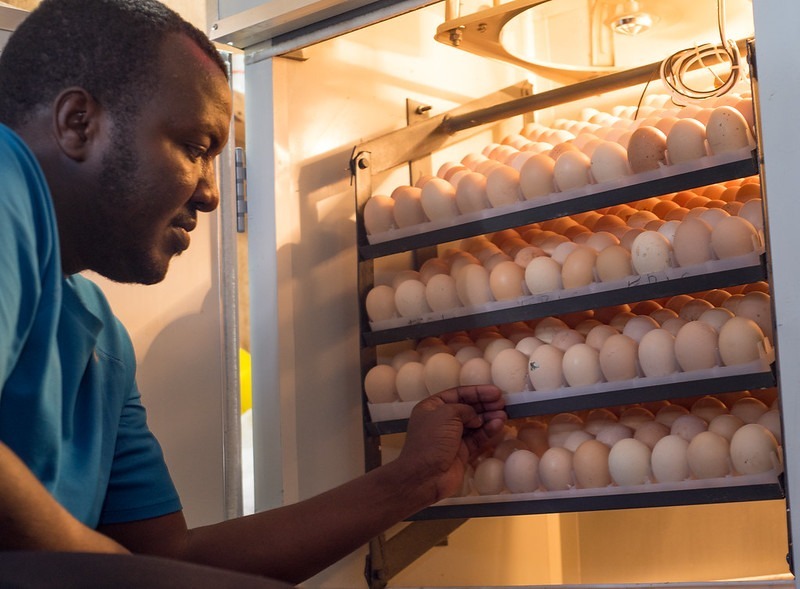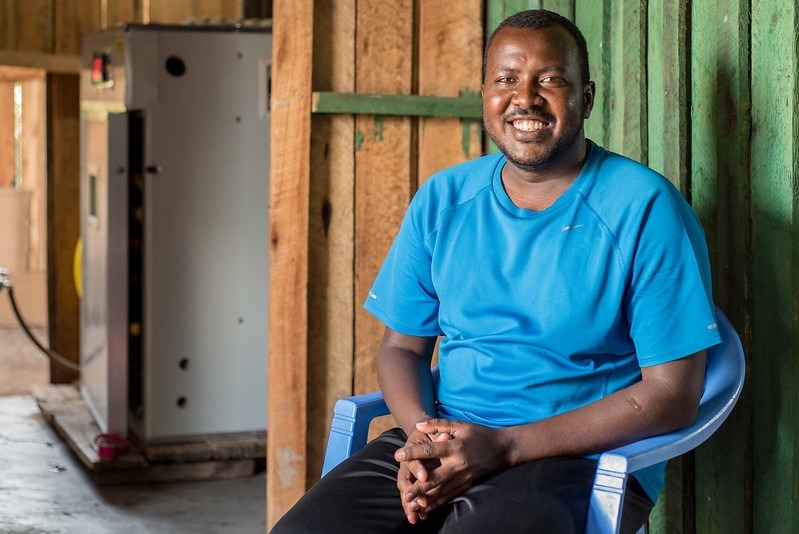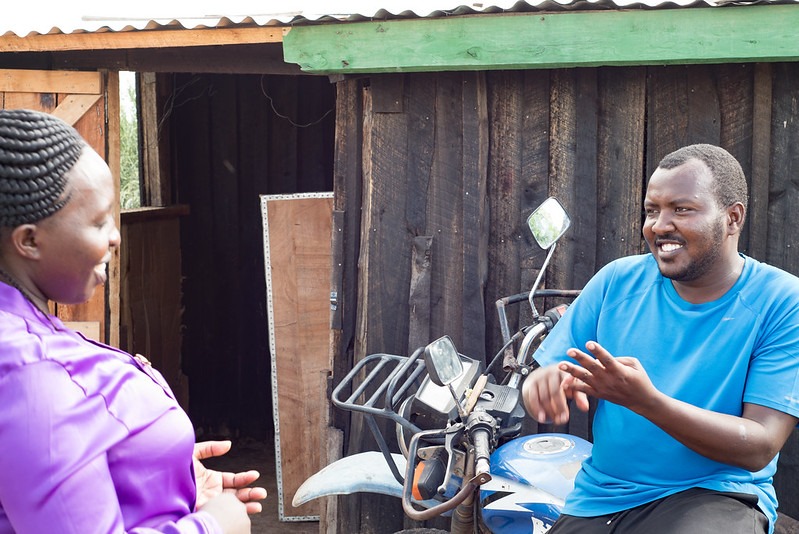
A few kilometers from Isiolo town in central Kenya, off the Isiolo – Marsabit highway, lies the ever-expanding Burat Ward. Located on the extensive savannah plain, the developing community of homesteads speaks to the rapid growth of Isiolo county. Winding down the pathways to the eastern end of the ward, one cannot miss the distinct chirping of chicks. As you draw closer to the homestead of 31-year-old Daud Diba, the sound gets louder. Connected to his home stands his hatchery, where you will find Daud and his employee Hassan Abdulrahman hard at work.
Daud’s entry into poultry farming is unique. He explains, “I hail from a pastoralist community where the preference is to keep cattle. This can be quite tedious as they need pasture and water to thrive. This is not the case with chicken and one of the main factors that drew me to poultry farming.” Another reason he started poultry farming was the growing appetite for chicken and eggs in Isiolo town. This made the venture financially appealing.
With this motivation, Daud started rearing chickens for sale in late 2016, but things did not go as planned. “When I began, I did not have a lot of information about what to do and how to raise the chicks to become chickens. I started with 50 chicks and only 40 survived to full maturity,” Daud narrated. Part of his flock included layers that laid at least 20 eggs a day. Of this, he would save some for home consumption for his wife and two children and sell the surplus.
Trainings Equip Farmer to Succeed
Business growth was slow and not what Daud had envisioned, but this was about to change. “In late 2018, I saw a Kenya Livestock Markets (LMS) Activity grant advertisement and I immediately visited the Isiolo office to find out more.” ACDI/VOCA implements the USAID-funded Feed the Future Kenya Livestock Market Systems (LMS) Activity. Through its Expanding Economic Opportunities Award, the activity offers farmers grants to strengthen and diversify their livelihoods. The grants, which target youth and women, facilitate an environment of inclusive economic growth to empower households to diversify their incomes.
After Daud’s application process and assessment of his business by LMS staff, he was enrolled into the program and began the training needed to grow his business. “As soon as I joined, I started attending several beneficial trainings from LMS on how to improve my poultry farm,” said Daud.

The courses included training on poultry rearing with lessons on identifying diseases, vaccinating the flock, and taking care of the chicks until they were egg laying or ready for consumption. He also received bookkeeping lessons to help him keep track of his expenditures, recurring costs, and calculating profits to make sound financial decisions. Over 60 farmers in Isiolo County, thanks to LMS, have gone through the same training as Daud. In late 2019, Daud received an incubator through LMS and with his cost-share contribution, he started his hatchery business. This investment, combined with the training he received from LMS, boosted his business significantly.
“Thanks to the incubator, I diversified my poultry keeping business by starting the hatchery.”
–Daud diba, poultry farmer & Feed the Future Kenya Lms participant
The incubator has a capacity of 352 eggs, and Daud was able to successfully hatch 220 chicks from his first batch. “Despite the loss of some chicks, I still made a good profit. This is because my initial investment was $70 (Kes. 7,000) and the gross return – after selling eggs, day-old chicks and one-month-old chickens – was $350 (Kes 35,000). My main costs were payment of one employee, poultry feed, and electricity. After paying this, I was able to add $205 (kes. 20,500) to my monthly household income.” Daud has continued to grow his poultry farm after seeking advice from LMS on how to minimize losses. Since then, every subsequent batch has grown as a result of the lessons received.
“Poultry keeping is very profitable. Thanks to it, my home income has increased significantly, and this has ensured that my family is well catered for and bills are paid on time.”
–DAUD DIBA, POULTRY FARMER & FEED THE FUTURE KENYA LMS PARTICIPANT
Daud plans to expand his operations by building a bigger coop and purchasing a larger incubator. He also hopes to open a kiosk in town to sell eggs and chicken for both rearing and consumption.
Project Supports Farmers During COVID-19 Crisis
The COVID-19 pandemic has presented several challenges for Daud, especially around the supply of eggs for his hatchery. The main sellers from Nanyuki town who used to supply Isiolo have since stopped coming, forcing buyers to travel to their farm to purchase the eggs. As the cost of travelling is high, Daud’s production has been affected. To mitigate against this restraint, LMS has facilitated a market linkage to enable Daud get eggs at a fair price by identifying a source from a closer market in Meru town and a local distributor in Isiolo. He has also been linked with a feeds depot where he can purchase cost-effective feed.

These targeted interventions by LMS have cushioned his income stream. Daud has also formed a WhatsApp group with 37 other prospective poultry farmers. “I believe that knowledge should be shared so using this platform, I share tips and ideas of what has worked for me with others so that they too can succeed,” Daud said.
Learn more about our Feed the Future Kenya Livestock Market Systems Activity here
Learn more about our work in Kenya here








